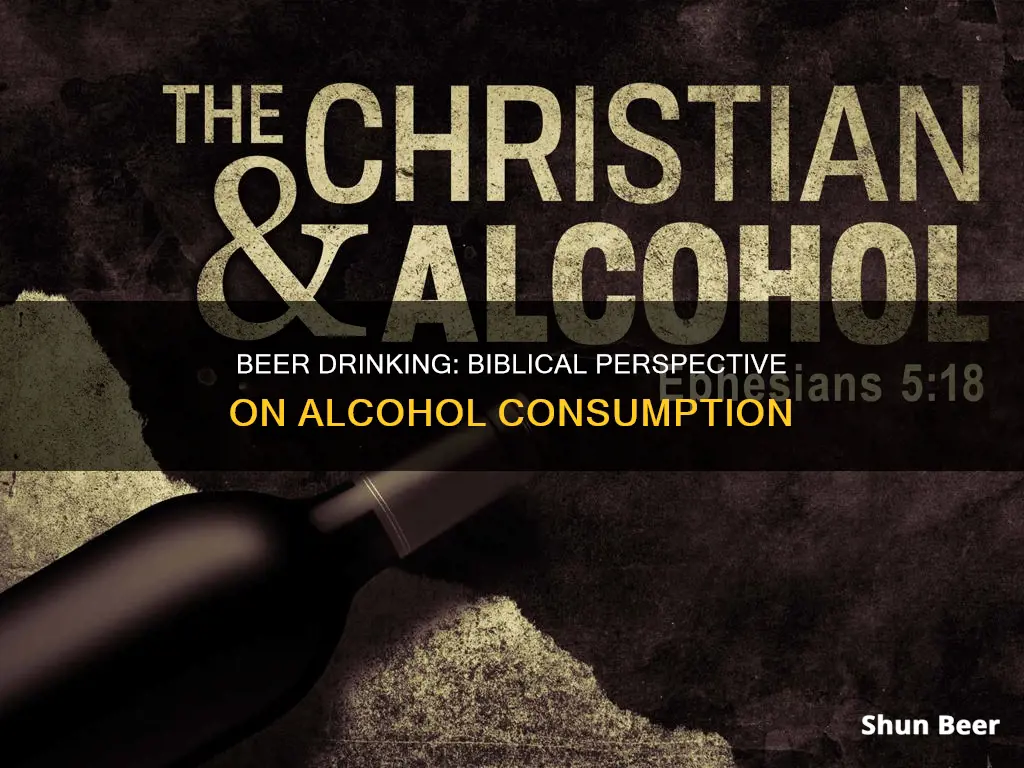
Drinking alcohol is a contentious issue among Christians and has been debated for thousands of years. While the Bible does not forbid drinking alcohol, it does caution against drunkenness. The Bible mentions wine in several passages and even suggests that it is part of heaven. However, it also warns against the dangers of overindulgence and the negative impact this can have on others.
| Characteristics | Values |
|---|---|
| Alcohol consumption | Not a sin |
| Alcohol consumption | Not forbidden in the Bible |
| Alcohol consumption | Not wrong |
| Alcohol consumption | A personal decision |
| Alcohol consumption | Can be a blessing |
| Alcohol consumption | Can be used for medicinal purposes |
| Drunkenness | A sin |
| Drunkenness | Forbidden in the Bible |
| Drunkenness | Can ruin lives |
| Drunkenness | Leads to God's judgment |
| Drunkenness | Can't be a leader in the church if addicted to alcohol |
| Drunkenness | Leads to bad decision-making |
What You'll Learn

The Bible doesn't forbid drinking beer
The Bible does not forbid drinking beer, or any other alcoholic drink. While the Bible is clear that drunkenness is a sin, it also discusses alcohol in positive terms.
For example, Ecclesiastes 9:7 says, "Drink your wine with a merry heart". Psalm 104:14-15 states that God gives wine "that makes glad the heart of men". Amos 9:14 describes drinking wine from your own vineyard as a sign of God's blessing. Isaiah 55:1 encourages, "Yes, come, buy wine and milk".
In the Bible, Jesus turned water into wine, and Paul recommended wine for health reasons. Wine was a common beverage in Palestine, including for Jesus. It was also used as a medicine, and in trade and worship.
The Bible does not say that alcohol is wrong, and it is not a sin to drink it. However, the Bible does caution against drunkenness, which can cloud judgment and lead to harmful behaviour. Drunkenness is described as spiritually dangerous, and Christians are encouraged to be guided by the Spirit, rather than substances.
Some Christian denominations approve of moderate and responsible alcohol consumption, while others oppose all use of alcohol and advocate for total abstinence.
The Perfect Corona Beer and Lime Pairing
You may want to see also

Drunkenness is a sin
The Bible does not forbid Christians from drinking beer, wine, or any other alcoholic drink. Alcohol, in and of itself, is not tainted by sin. However, drunkenness is considered a sin in the Bible.
The Bible contains several warnings about the dangers of drunkenness, which is described as spiritually dangerous. Ephesians 5:18 states: "Do not get drunk on wine, which leads to debauchery. Instead, be filled with the Spirit." Similarly, Proverbs 20:1 says: "Wine is a mocker and beer a brawler; whoever is led astray by them is not wise." Drunkenness is linked to other vices, such as sexual immorality, idolatry, jealousy, rage, and greed.
Christians are encouraged to be mindful of not leading others into temptation and to avoid anything that might offend other Christians or encourage them to sin (1 Corinthians 8:9-13). Due to the potential for abuse and addiction, as well as the negative impact alcohol can have on people's lives, some Christian denominations advocate for total abstinence.
While the Bible does not forbid alcohol consumption, it is clear that drunkenness is a sin. Christians are commanded to avoid drunkenness and to be filled with the Spirit instead.
Mixing Beer and Wine: What's the Harm?
You may want to see also

Alcohol can be a blessing
Alcohol can enhance social gatherings and encourage relaxation, happiness, and laughter. These are all blessings from God. In addition, alcohol can be used for medicinal purposes. "Give strong drink to the one who is perishing, and wine to those in bitter distress" (Proverbs 31:61, 1 Timothy 5:23). In the past, before modern medicine, alcohol was often used to relieve pain. This, too, is a blessing from God in a world full of suffering.
The Bible also mentions wine as a gift from God to gladden men's hearts (Genesis 27:28, Psalms 104:14-15). Wine was used at weddings and celebrations (John 2:1-3) and was a common beverage in Biblical times, including by Jesus (Matthew 11:19, Luke 5:38-39, Luke 7:34). Wine was also used in worship (Exodus 29:40, Leviticus 23:13, Numbers 15:5) and in trade and for payment of debts (2 Chronicles 2:10, Ezekiel 27:18, Amos 2:8).
It is important to note that while alcohol can be a blessing, drunkenness is strongly condemned in the Bible. Christians are allowed by God to drink alcohol, but we are forbidden to get drunk (Ephesians 5:18). The Bible warns against the dangers of drunkenness and the negative impact it can have on one's life and spiritual well-being.
Beer and Pancreatitis: What You Need to Know
You may want to see also

Jesus drank wine
The Bible does not forbid Christians from drinking alcohol, but it does warn against drunkenness. While some Christians believe in complete abstinence, others think it's acceptable to drink in moderation.
Jesus's first public miracle was turning water into wine at the wedding feast in Cana (John 2). This was not grape juice but wine with alcohol content, as it was praised by guests and received rave reviews. During the Last Supper, Jesus also took a cup of wine and gave it to his disciples to drink.
Some Bible passages discuss alcohol in positive terms. Ecclesiastes 9:7 says, "Drink your wine with a merry heart." Psalm 104:14-15 states that God gives wine "that makes glad the heart of men." Amos 9:14 discusses drinking wine from your own vineyard as a sign of God's blessing.
However, the Bible also contains warnings about overindulgence. Ephesians 5:18 says, "Do not get drunk on wine, which leads to debauchery. Instead, be filled with the Spirit." Proverbs 20:1 and 23:29-35 also caution against drunkenness and alcoholism.
In conclusion, while Jesus did drink wine, the Bible emphasizes the importance of moderation and warns against the negative consequences of excessive alcohol consumption.
Beer and Aleve: Safe Mix or Health Risk?
You may want to see also

Alcohol is safer than water
Drinking alcohol is a controversial topic among Christians and has been debated for thousands of years. While some Christians advocate complete abstinence, others believe it's acceptable to drink in moderation. The Bible does not forbid drinking alcohol, but it does condemn drunkenness and addiction. For example, Ephesians 5:18 says, "Do not get drunk on wine, which leads to debauchery. Instead, be filled with the Spirit." Similarly, 1 Corinthians 6:12 and 2 Peter 2:19 warn against allowing alcohol to control one's body.
In Bible times, water was often contaminated with bacteria and other impurities, making it unsafe to drink. As a result, people sometimes drank wine or grape juice instead, as these were less likely to be contaminated. In 1 Timothy 5:23, Paul advised Timothy to drink wine instead of water, likely due to stomach issues caused by impure water.
Today, we know that alcohol, in small quantities, is generally safe and can even have health benefits, especially for the heart. However, excessive alcohol consumption can lead to addiction and negative health consequences.
In conclusion, while the Bible does not forbid alcohol consumption, Christians are cautioned against drunkenness and addiction. Alcohol, when consumed in moderation, can be safer than water, especially in areas with impure water sources.
Beer and the Golo Diet: What You Need to Know
You may want to see also
Frequently asked questions
Drinking beer is not considered a sin in Christianity. The Bible mentions that Jesus drank wine on occasion (John 2:1-11; Matthew 26:29; Luke 7:34) and also turned water into wine (John 2:1-11). However, the Bible warns against drunkenness and addiction to alcohol (Ephesians 5:18; 1 Corinthians 6:12; Proverbs 23:29-35).
The Bible mentions alcohol, specifically wine, in several passages and even includes it as part of heaven. It is described as a gift from God to "gladden the hearts of men" (Psalm 104:14-15; Genesis 27:28). Alcohol was also used for medicinal purposes (Proverbs 31:6; 1 Timothy 5:23). However, the Bible cautions against drunkenness, which can lead to harmful behaviour (Romans 13:13; Galatians 5:19-21).
Yes, there are several verses in the Bible that discourage drinking alcohol or warn against its negative consequences:
- Romans 14:21 - "It is good neither to eat flesh, nor to drink wine, nor anything whereby thy brother stumbleth, or is offended, or is made weak."
- Proverbs 20:1 - "Wine is a mocker and beer a brawler; whoever is led astray by them is not wise."
- Proverbs 23:20-21 - "Be not among drunkards or among gluttonous eaters of meat, for the drunkard and the glutton will come to poverty, and slumber will clothe them with rags."
- 1 Corinthians 10:31 - "So whether you eat or drink, or whatever you do, do all to the glory of God."
Yes, some Christian denominations, such as the Assemblies of God, Southern Baptist, and United Methodist churches, oppose the use of alcohol and advocate for total abstinence. This is due to the potential for abuse and addiction, as well as the negative impact alcohol can have on various aspects of life, including health, social relationships, and employment.







